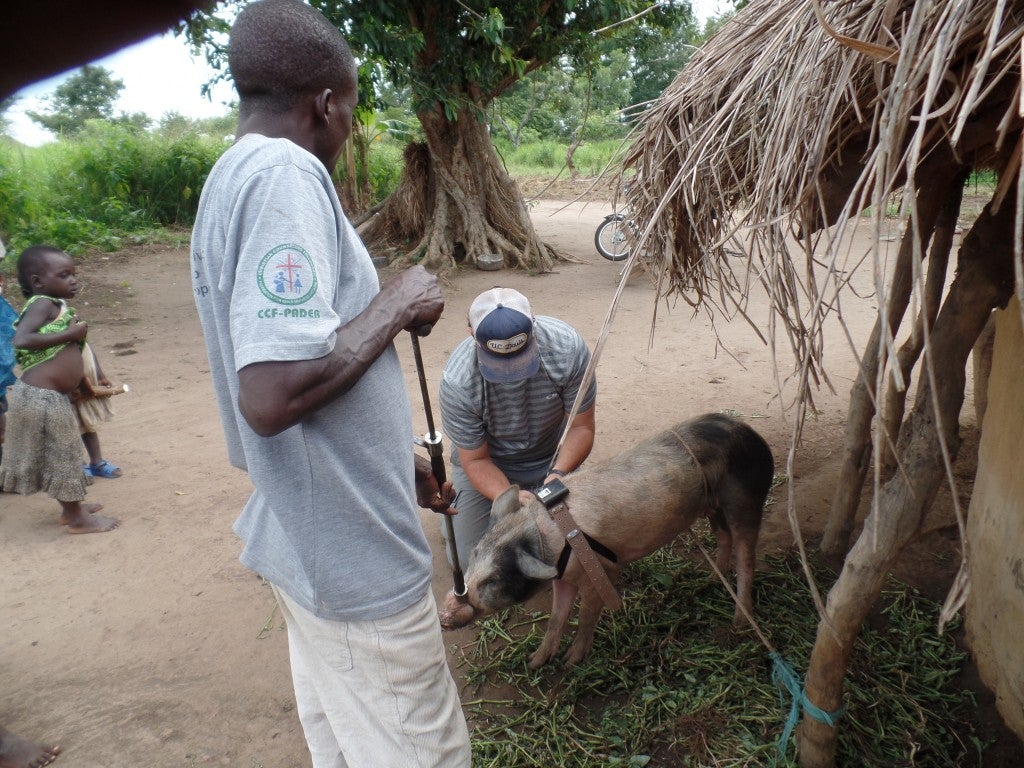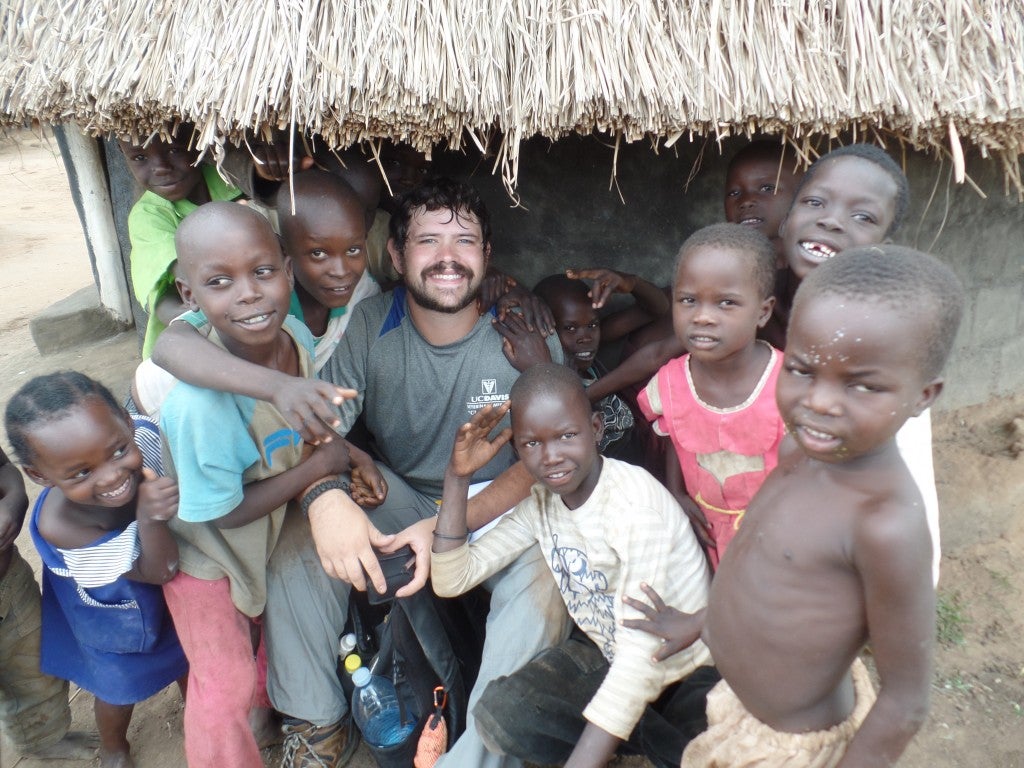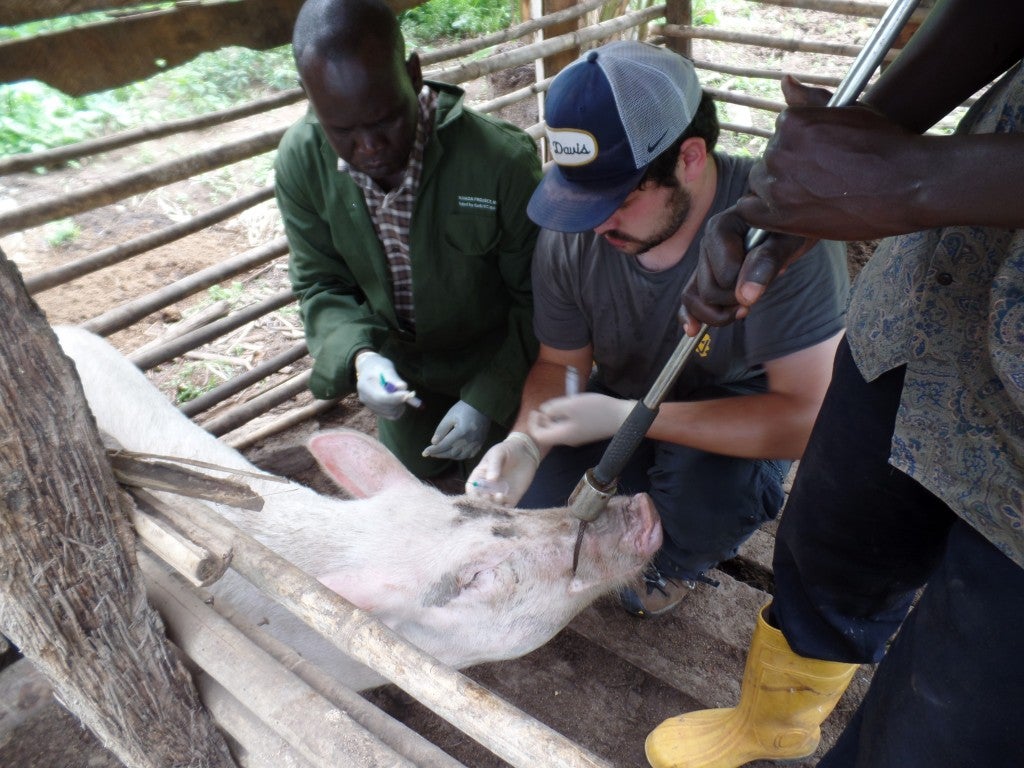Contributed by Cody Blumenshine, Class of 2018
My interest coming into veterinary school has been to pursue a career in zoonotic disease research. With my interest in zoonotic diseases, the idea of One Health resonates with my perspective on life. I was fortunate to find a research project with Dr. Beatriz Martinez Lopez that allowed me to incorporate a One Health approach. With aid from the Office for Global Programs and Students Training in Advanced Research, I was able to spend six weeks in Nwoya District, Northern Uganda, performing research on African Swine Fever (ASF). ASF is not a zoonotic disease, but because of the disease dynamics in how the hosts, people, and the environment interact, it embodies One Health.
At the beginning of my stay I was very fortunate to have a friend and colleague, Dr. Esther Kukielka, aid me. She helped me prepare for my research, but she also helped me transition into the lifestyle and expectations that were associated with staying in Uganda. The latter was more important to me, because this was my first international travel experience. Esther introduced me to locals, team members, and she made sure I was well situated with the accommodations of our mud-hut in the village of Lutuk. Prior to leaving, Esther allowed me to help facilitate a participatory epidemiology exercise for her study. The exercise consisted of using group activities with local pig farmers to gain a deeper understanding of their collective knowledge of ASF.
After Esther left, I found the beginning of my stay to be difficult. My interactions with the local people was not what I expected. For the first time in my life I experienced being judged based on my nationality. It was disheartening that many people in Uganda saw me only as an American who had money. I had idealized that my research would allow me to get to know people and build strong relationships, but I was disappointed that most of my conversations were superficial and ended with solicitations for money or with people asking me to purchase them a pig to then be raised in my name. It took all of my emotional capacity to empathize and continually remind myself that their actions were partially justified based on the hardships they face every day.
Fortunately at the half way point of my stay I met one family that changed my entire outlook. With no solicitation on my part, one family offered me a bundle of passion fruits that they would have normally sold at the market. After being continually denied by my advances to pay, I was overcome with emotions. Seeing that a family who had little economically, give me a gift, was a humbling experience that I will cherish. My interaction with this family showed me that I was wrong to generalize the Ugandan people as superficial and their kindness helped me cultivate compassion that I was lacking.
 The research I conducted looked at the domestic wildlife interface of ASF by trying to assess the interaction between warthogs, soft ticks, and the domestic pigs. Different techniques were utilized including setting yeast tick traps in pig sties, GPS collaring of domestic pigs to establish their home ranges, obtaining blood samples, and geocoding study participant’s households. I gained valuable experience in the different techniques used, but I gained an even more valuable experience in understanding the difficulty and gratification of performing field work in Africa. For example, the original plan was to use dry ice traps to catch soft ticks. Very shortly after my arrival, it become apparent that the logistics of getting dry ice to the far North of Uganda was near impossible. Fortunately this pitfall became a learning experience. I was provided with an opportunity to problem solve and think of an alternative solution. With aid from collaborators we were able to design a new tick trap that utilized yeast as an attractant. In the end we never caught a tick, but it was satisfying to design a new trap that addressed our needs.
The research I conducted looked at the domestic wildlife interface of ASF by trying to assess the interaction between warthogs, soft ticks, and the domestic pigs. Different techniques were utilized including setting yeast tick traps in pig sties, GPS collaring of domestic pigs to establish their home ranges, obtaining blood samples, and geocoding study participant’s households. I gained valuable experience in the different techniques used, but I gained an even more valuable experience in understanding the difficulty and gratification of performing field work in Africa. For example, the original plan was to use dry ice traps to catch soft ticks. Very shortly after my arrival, it become apparent that the logistics of getting dry ice to the far North of Uganda was near impossible. Fortunately this pitfall became a learning experience. I was provided with an opportunity to problem solve and think of an alternative solution. With aid from collaborators we were able to design a new tick trap that utilized yeast as an attractant. In the end we never caught a tick, but it was satisfying to design a new trap that addressed our needs.
Without a doubt working in Uganda was a struggle, but the lessons I learned, both scientific and cultural, will definitely have a profound effect on shaping my career and life. Even with my struggles, I would go back to Uganda because it truly was an eye-opening experience.


